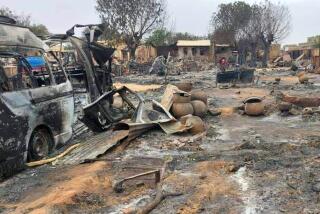U.N. official concerned for Darfur force
- Share via
UNITED NATIONS — The U.N. peacekeeping chief told the Security Council on Wednesday that a Sudanese attack this week on U.N.-led troops reinforces concerns that the force may be unable to protect itself or civilians in Darfur.
The violence, along with foot-dragging by the Sudanese government and the lack of necessary helicopters and equipment, may doom the peacekeeping effort, Jean-Marie Guehenno told the council.
“Without decisive progress on each of those three issues, we will indeed face dire consequences for the international efforts to help the Sudanese bring peace and stability to Darfur,” Guehenno said.
On Monday night, an armed force in Darfur attacked a peacekeeping supply convoy of more than 20 vehicles marked with the United Nations logo. Guehenno said that the area commander for the Sudanese military confirmed responsibility for the attack shortly afterward by telephone.
On Wednesday, however, Sudanese officials in the capital, Khartoum, and New York denied responsibility and said rebels backed by neighboring Chad had orchestrated the attack to put the government under pressure.
“They were not the government,” said U.N. Ambassador Abdalmahmood Abdalhaleem. “The rebels did that. No doubt about it.”
The attack was only the most immediate problem facing the new peacekeeping mission.
The African Union forces switched their berets from AU green to U.N. blue on Dec. 31, signaling the beginning of a joint peacekeeping operation by the two organizations that ultimately is expected to include 27,000 personnel. So far, about 9,000 troops and police are in place to protect civilians threatened by conflict in an area larger than California.
But Guehenno lamented that continued obstacles put up by Sudan make many countries reluctant to offer personnel and equipment.
The government has rejected non-African soldiers and said it won’t allow a team of Scandinavian engineers to help build roads and airstrips, further delaying deployment.
Khartoum still has not consented to night flights, supplied land and water for bases in some areas or provided visas, Guehenno said. The government insists that African personnel wear green berets and non-Africans wear blue to differentiate them, a demand the U.N. has ignored, saying it goes against the original agreement as well as the U.N. charter.
U.N. Secretary-General Ban Ki-moon called Sudanese President Omar Hassan Ahmed Bashir after the attack, and the pair will meet in two weeks at an African Union summit in Ethiopia to iron out remaining technical and political obstacles to the force’s deployment.
Guehenno told the Security Council in December that it might be better to not deploy a U.N. force at all than to deploy one that was too vulnerable, recalling tragedies involving overwhelmed peacekeepers in Bosnia-Herzegovina, Sierra Leone and Liberia.
But the people of Darfur have little choice, with more than 300,000 people newly displaced in 2007 and malnutrition rates rising, despite the decrease in attacks on civilians by government-backed militias that earlier in the decade drove more than 2 million people from their homes.
Aid workers are also at risk, with 13 killed and 147 abducted last year. Rebels continue to clash with government soldiers and militias, as well as with other rebel groups, over wealth, power and land. Peace talks have made little headway in stopping the 4-year-old conflict.
The U.S. ambassador to the U.N., Zalmay Khalilzad, said the Bush administration considers the continuing conflict in Darfur to be “very important” and a challenge “to the credibility of the international community, the credibility of the U.N., the credibility of the Security Council.”
“But we’re not where we need to be,” he said. “We need to take stock and see what adjustment needs to be made.”
--
More to Read
Sign up for Essential California
The most important California stories and recommendations in your inbox every morning.
You may occasionally receive promotional content from the Los Angeles Times.









